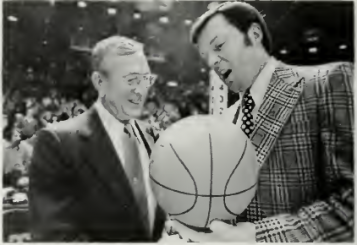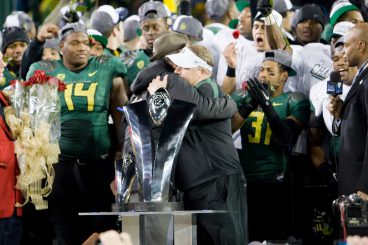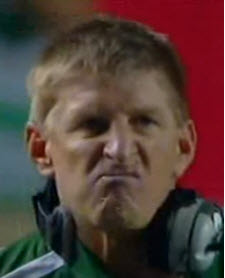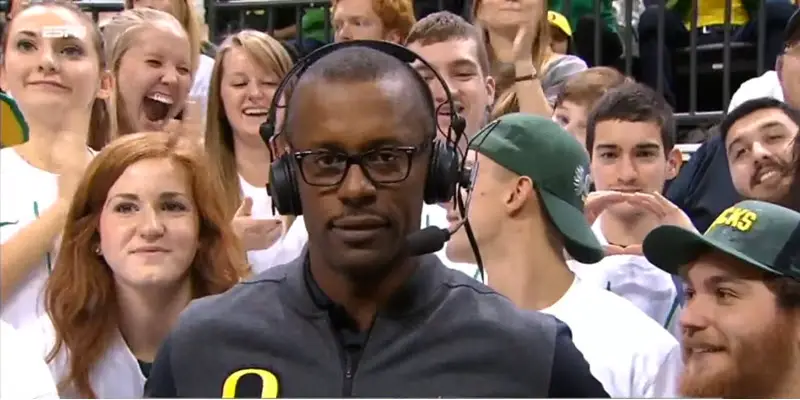This article will be mainly conceptual – not anecdotal. I wrote a book with dozens of stories to illustrate the concepts I’m going to talk about here. But this isn’t the place to cite a lot of those anecdotes. Mike Morris (Grizzled Ol’ Coach)
My concept is stated in my title. It’s based on 30 years of being a high school teacher and coach, but more importantly my thesis is based on 74-plus years of being a very judgmental observer of the actions of others.
There was a moment in my early years of teaching, coaching and observing when I realized, “All ‘great’ coaches [in football and basketball] are ‘feared’ by their players.” My following years have substantiated that concept.
To clarify: I don’t just mean “respected” – that’s too vague a term. I mean the players are truly “afraid” of doing an action that their coach will disapprove of. This also involves my, possibly skeptical, definition of most people’s “conscience”: the fear of getting caught.
Over the years, thanks to higher standards of conduct, the methods of gaining that fear have lessened. Most older folks will lament the lack of discipline [the fear of consequences for their behavior] in today’s young folks. But football coaches are still allowed to punish their players to establish accountability or discipline [instill fear of improper actions] in ways other teachers and, even, parents can’t.
When I was a student at UCLA from 1963 to ’65, I was fascinated by the differences in attitudes toward their coaches between the football and basketball players. Most football players couldn’t have cared less about what their coaches thought of them, and practiced, played and lived that way. On the other hand, the basketball players were “terrified” about ever displeasing Coach John Wooden, on or off the court.

John Wooden (left) receives game ball from Notre Dame coach Digger Phelps after UCLA beat the Fighting Irish in 1973.
Wooden never uttered a profanity or gave a long-winded speech during his practices; he never even gave his players extra conditioning for improper play [He felt all conditioning work should be done while practicing relevant basketball fundamentals]. But, during basketball season, from 3:00 p.m. to 5:30 p.m., EVERY player was held highly accountable for EVERY action he made during practice.
Even the slightest mistake in execution was sternly noted by Coach Wooden. His players constantly admitted that they were emotionally exhausted at the end of his practices. And this fear of failing Coach Wooden’s standards was present BEFORE Wooden’s teams won 10 NCAA Championships in the next 12 years.
Other great coaches of that era instilled similar fear in their players for giving less than their best. Among them icons Vince Lombardi, Bear Bryant, Woody Hayes and Bo Schembeckler.
As a high school football coach, I always tried to maintain high standards of accountability. Imprecise fundamentals were almost always repeated until they were executed to my satisfaction. If there was even one mistake on a team offense or defense play, that play would have to be repeated by all until everyone did their assignment correctly.
Lacking Coach Wooden’s strong personality, I had to resort to ups-and-downs [hard conditioning] to punish improper behavior, on or off the field, always forcing our entire team to do the same amount as the guilty player or players [Peer pressure is extremely helpful in controlling improper behavior]. Oh, it definitely got boring, and contributed to an early retirement, but I wouldn’t have been able to coach with lower standards. Looking back at my coaching career, I get a lot of satisfying self-respect, less for what we accomplished than for how we accomplished it.
When I retired and moved from Southern California to the Eugene area in 1992, I was able to go right out on the fields and watch the Ducks and Beavers practice. I envied the amount of assistant coaches and time they had to practice only offense or defense. But was surprised how [maybe too] quickly they practiced, with little attention to detail. A few of my high school players were playing for the Ducks and Beavs then; when I asked about the quality of the coaches, I got kind of “They’re okay . . .” shrugs. Definitely no mention of demandingly precise practices. I’d categorize it as “limited respect” for their coaches.
I realized my coaching days were done, and became a Ducks’ fan. I appreciated Mike Bellotti’s intelligence and demeanor, but only occasionally attended practices or watched game tapes. Those Duck teams weren’t great, but they were fun to watch, without having too high aspirations.

Chip Kelly after 2011 Pac-12 Football Championship victory
But, as most of you are well aware, things changed a lot in 2006 when Chip Kelly was hired, first as the offensive coordinator and then as the head coach in 2007. Kelly’s uniquely intelligent quirkiness brought a whole different way of practicing football to the Ducks. Among the changes my old allies, accountability and fear, were now present at practices.
Kelly’s hand-picked defensive line coach, Jerry Azzinaro, brought a new kind of energy and fear of giving less than their best from the players during practices. Even John Neal admitted that Kelly and Azz scared him into becoming a better football coach
Like most of you, I just sat back and enjoyed the exciting new brand of football from the Chip Kelly era. The only thing that bothered me was that Kelly rarely emphasized precision through repitition. But what did I know? That was “old school” coaching.
Then we began the Mark Helfrich era, and, man, did I buy into it. “He’s better than Kelly because he’s actually improved the offense and he’s a genuinely nice guy” was my mindset, even through this disastrous 2016 season. I didn’t heed the warning signs, particularly the signs of lack of coach and player accountability and the players’ lack of fear of improper conduct, on and off the field.
Oh, I didn’t like Helfrich’s eternally optimistic, unconditional love, spin on things. He seemed to never have a practice he didn’t think was great. But he always seemed to emphasize the amount of plays they ran in a practice, not the preciseness of those plays. Football love must be “conditional”. As Coach Wooden said, “Never mistake activity with achievement.”
As we’re learning now, things were definitely crumbling in the world of Ducks’ football, and not just on the field.

Jim Leavitt might be feared….
Before I knew Helfrich would be fired, Willie Taggart, while at USF, impressed me as I read about him. His players admired him as a strong father figure, who’d never “bullshit” them. In 2016 when Taggart’s USF team lost an early season game to an excellent Temple team, Taggart said his team’s performance was “unacceptable” and would “never happen again.” USF never lost a game after that admonishment. I thought at the time, “Wouldn’t it be great if Helfrich was that kind of leader?”
Well, we now have that kind of leader. Oh, Taggart might look meek and mild, but, as we’re finding out almost daily, he’s an extremely ambitious, plan-for-everything and take-no-bullshit kind of guy. Willie Taggart definitely fully understands strict accountability.
A new, very high, expectation bar has been set for the Ducks’ football players, and I’m sure they are enthusiastically afraid of seeing if they can meet those new expectations. Ducks’ players are already well-aware of not incurring the wrath of Taggart or his dream team of very demanding, charismatic assistant coaches.
Yeah, Ducks’ fans and the rest of the football world, accountability and fear are alive in Eugene, Oregon, and great football teams, on and off the field, will soon be produced by great football coaches.
Retired Coach Mike Morris (Grizzled Ol’ Coach)
Pleasant Hill, Oregon
Top Photo by Video
My friends…managing a website is more than I have time for now, as I am working on a new project for fans that will surface in a year or two. But I and a few others, (like our beloved Grizzled Ol’ Coach Mike Morris) will continue to write sporadically when the mood and time available converge.
We will be starting the Newsletter in the near future, so sign up in the upper left of the site so you don’t miss our articles when they become published. (It only takes a minute and I never sell the information) And post the articles on your favorite Social Media sites below! Charles Fischer
Related Articles:
Seven Offensive Coordinator Candidates for the Oregon Ducks
A Legendary Coach Explains Cristobal to Fans: Win with STRATEGY, Not Scoring
Analytics vs. Common Sense: For Coaches Making the BIG DECISIONS
Five Candidates to Replace OC Marcus Arroyo
Coach Jim Mastro: The Perception, and the Truth
Has Oregon Turned the Corner on Offense?
Coach Mike Morris spent 30 years coaching at seven different high schools throughout Southern California. He coached many players who went on to Pac-12 programs including Oregon, such as Saladin McCullough. He is a writer, Football analyst and a good friend of the Principal of the site.

